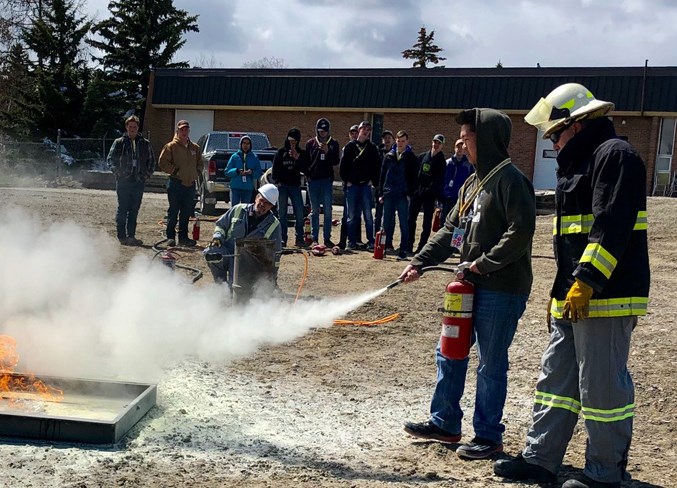About 85 high school students from across the region took part in the Young Farm Workers Safety Training event at Olds College on April 29.
The 14th annual event included lectures and hands-on safety training. It was put on by a committee of volunteers and safety-focused organizations.
Student participants earn high school credits by completing the workshop.
The event included lectures on confined space grain handling, machinery handling, power line safety, equine first aid, animal rights, fire extinguisher training, rural road travel safety, and mental health in agriculture.
Cynthia Beck, a suicide intervention responder, presented a lecture titled Rooted in Strength – Improving Your Mental Health As A Farmer Or Rural Producer.
In an interview, she said assessing your mental health is always an important consideration when it comes to farm safety.
“Your mental health affects how you think, how you feel, and your actions and behaviours,” said Beck. “If you are stressed out and overwhelmed and you are trying to get everything done, then that can affect how you farm. Mental health affects every decision you make and your ability to make decisions and pay attention.
“If you are in a place of poor mental health then you don’t have the ability to think clearly. Everyone should be thinking about their mental health.”
There are a number of indications that a person may be developing mental health issues, she said.
“Things can start to change,” she said. “It’s not very often that we slow down and ask ourselves ‘how am I doing?’ Self-awareness is very important.
“Typically one of the first patterns that change when we are having diminishing mental health is our habitual patterns (such as) eating and sleeping start to change. Maybe we start eating more or craving food we didn’t crave before. Maybe you’re not sleeping enough because you are thinking, or all you want to do is sleep.”
Anyone who believes they may be having mental health issues on the farm should seek help without delay, she said.
“Your first step is having awareness of yourself. What am I going through? What am I dealing with right now? How long has this been going on?
“A lot of people talk to their family doctor first. Hopefully your family doctor is of the generation where they refer you to a counsellor of some kind. You can have psychologists, psychiatrists, and therapists. Some people even speak to their religious clergy. Or talk to a friend that you trust.”
The April 29 workshop was put on by a committee made up of representatives from Safe Communities Central Alberta, Green Certificate Agricultural Training, Farm Credit Canada, Canadian Society of Safety Engineering, Ag for Life, Tatonga, Olds Auction Mart, Heartland Promotions, UFA, and Fortis Alberta.
Pamala Church is regional coordinator of Green Certificate Agricultural Training. She said learning farm safety at an early age has lifelong benefits.
“The whole idea is to make smart choices when you are farming so that you keep people safe,” said Church.
Iris Steinley is coordinator with Safe Communities. She said bringing multiple stakeholders together to teach young people about farm safety is one of the workshop’s benefits.
Facilitators at the workshop included Kneehill County, Roberts Safety Ltd., Olds College, Alberta Farm Animal Care, and Ultimate Safety Alberta.




